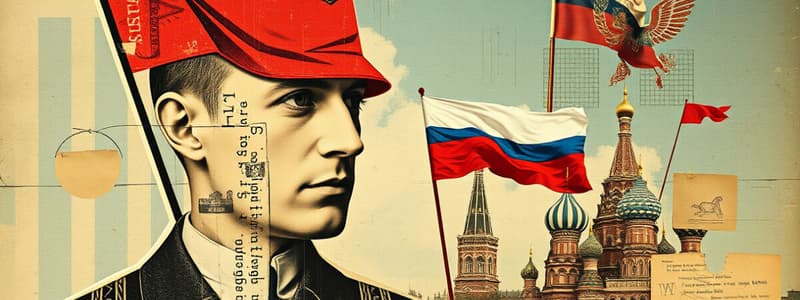Podcast
Questions and Answers
What was a significant limitation on personal freedom of the Russian serfs after the Emancipation of the Serfs in 1861?
What was a significant limitation on personal freedom of the Russian serfs after the Emancipation of the Serfs in 1861?
- They could freely start their own businesses.
- They had no access to education.
- They were subject to redemption payments. (correct)
- They could vote in elections.
Which reform aimed to improve personal freedom during Alexander II’s reign?
Which reform aimed to improve personal freedom during Alexander II’s reign?
- The establishment of political prisons.
- The mandate for nobles to have trials.
- The introduction of independent jurors. (correct)
- Restrictions on career choices.
What primarily curtailed personal freedoms despite the legal reforms implemented by Alexander II?
What primarily curtailed personal freedoms despite the legal reforms implemented by Alexander II?
- The increase of university access.
- The legal rights of the nobility.
- The influence of the mir on peasants. (correct)
- The abolition of the legal system.
How did Alexander II’s reign impact educational opportunities for the Russian populace?
How did Alexander II’s reign impact educational opportunities for the Russian populace?
Which aspect of political freedom was notably limited during the reign of Alexander II?
Which aspect of political freedom was notably limited during the reign of Alexander II?
What was a consequence of the assassination attempts during Alexander II's rule?
What was a consequence of the assassination attempts during Alexander II's rule?
Which limitation on religious freedom is most closely associated with Alexander II’s governance?
Which limitation on religious freedom is most closely associated with Alexander II’s governance?
What measure was taken by the government to maintain control over political dissent?
What measure was taken by the government to maintain control over political dissent?
Which group of students primarily attended the gymnasia during Alexander II's reign?
Which group of students primarily attended the gymnasia during Alexander II's reign?
What was a significant outcome of the relaxed censorship under Alexander II?
What was a significant outcome of the relaxed censorship under Alexander II?
What was a key event concerning the Polish population during Alexander II's reign?
What was a key event concerning the Polish population during Alexander II's reign?
How were Polish serfs treated compared to Russian serfs after their emancipation?
How were Polish serfs treated compared to Russian serfs after their emancipation?
What limitation was placed on the Polish language during Alexander II's reign?
What limitation was placed on the Polish language during Alexander II's reign?
What significant action did Alexander II take regarding the Jewish population in 1865?
What significant action did Alexander II take regarding the Jewish population in 1865?
What was the role of the zemstva during Alexander II's reign?
What was the role of the zemstva during Alexander II's reign?
What restricted the political representation provided by the zemstva?
What restricted the political representation provided by the zemstva?
What was a significant legacy of Alexander II's approach to Russian minorities?
What was a significant legacy of Alexander II's approach to Russian minorities?
What was the status of education for Ukrainian people under Alexander II?
What was the status of education for Ukrainian people under Alexander II?
What percentage of the provincial zemstva did the upper class represent?
What percentage of the provincial zemstva did the upper class represent?
What was a key characteristic of the political climate during Alexander II's rule?
What was a key characteristic of the political climate during Alexander II's rule?
What was one positive change for Jews under Alexander II?
What was one positive change for Jews under Alexander II?
How did Alexander II respond to opposition during his reign?
How did Alexander II respond to opposition during his reign?
What was a significant outcome of the Loris Melikov reforms in 1880-1881?
What was a significant outcome of the Loris Melikov reforms in 1880-1881?
Which legislative body was formed in Finland under Alexander II?
Which legislative body was formed in Finland under Alexander II?
How did Alexander II respond to the Polish Revolt in 1863?
How did Alexander II respond to the Polish Revolt in 1863?
What was the primary religious group favored during Alexander II's reign?
What was the primary religious group favored during Alexander II's reign?
What action did Alexander II take against the Catholic Church after the Polish Revolt?
What action did Alexander II take against the Catholic Church after the Polish Revolt?
How did the Russian government approach Judaism under Alexander II?
How did the Russian government approach Judaism under Alexander II?
Which of the following statements regarding Protestantism during Alexander II's reign is true?
Which of the following statements regarding Protestantism during Alexander II's reign is true?
Why were personal freedoms maintained with controlling measures under Alexander II?
Why were personal freedoms maintained with controlling measures under Alexander II?
What was a major limitation faced by the middle classes during Alexander II's reign?
What was a major limitation faced by the middle classes during Alexander II's reign?
What was the role of the Orthodox Church during Alexander II's reign?
What was the role of the Orthodox Church during Alexander II's reign?
What was Alexander II's approach toward the practice of religions other than Orthodoxy?
What was Alexander II's approach toward the practice of religions other than Orthodoxy?
Total loss of Polish autonomy was a direct result of which event?
Total loss of Polish autonomy was a direct result of which event?
Which policy was used to control the population's religious beliefs under Alexander II?
Which policy was used to control the population's religious beliefs under Alexander II?
What was a common feature of the government’s policy towards minorities during Alexander II's rule?
What was a common feature of the government’s policy towards minorities during Alexander II's rule?
Flashcards are hidden until you start studying
Study Notes
Limitations on Personal Freedom
- Prior to Alexander II, personal freedom was virtually nonexistent in Russia for most individuals.
- Emancipation of the Serfs in 1861 allowed serfs to marry freely, yet redemption payments and mir controls limited their true autonomy.
- Legal reforms improved access to justice, including paid judges and independent jurors; however, political prisoners faced special courts post-Vera Zasulich incident.
- Educational reforms increased accessibility at all levels, yet restrictions were imposed after assassination attempts, limiting university access to upper-class students.
- A temporary relaxation in censorship saw a tripling of publications between 1864 and 1881, though widespread illiteracy limited public engagement with literature.
- The Third Section was utilized for state oppression, including opposition suppression through exiles to Siberia.
Limitations on Personal Freedom for Minorities
- Minority personal freedoms varied, with partial improvements but significant restrictions.
- Polish serfs gained better terms during emancipation but faced harsh military action after the 1863 Revolt, losing autonomy and educational rights in Polish.
- Ukrainian identity was stifled by bans on Ukrainian publications and literature, indicating an effort to suppress cultural expression.
- Jewish individuals had some improved rights, particularly artisans, but remained largely restricted in mobility, employment, and land ownership, with rampant antisemitism still present.
Limitations on Political Freedom
- No national Duma existed, limiting political representation; local governance through zemstva and dumas was dominated by the upper class.
- Reforms proposed in the early 1880s sought to bring noble and peasant advice to governance but ended abruptly after Alexander II's assassination.
- In Finland, a parliament was established in 1863 allowing legislative participation, contrasting sharply with the loss of Polish political autonomy following the 1863 Revolt.
Limitations on Religious Freedom
- Orthodox Christianity was tightly controlled, serving state goals and promoting loyalty to the Tsar.
- Although non-Orthodox faiths saw slightly more tolerance, Catholicism faced restrictions, particularly after the Polish Revolt, emphasizing state suspicion of its influence.
- Alexander II’s policies aimed to suppress Catholic Church structures, control education, and limit communication with the Vatican to quash external influences.
- For Jews, government interference was less direct, with no mass attempts at conversion, although local prejudices persisted.
- Protestants in the Baltic and Finland experienced relative stability, with some privileges, but faced eventual pressures under later Tsarist regimes.
Concluding Points
- Alexander II's policies reflected a conditional approach to personal, political, and religious freedoms, intricately balancing state authority with limited liberal reforms.
- The need to maintain autocratic control fundamentally governed the extent and nature of freedoms granted, often leading to suppression of dissent and cultural identities.
Studying That Suits You
Use AI to generate personalized quizzes and flashcards to suit your learning preferences.




